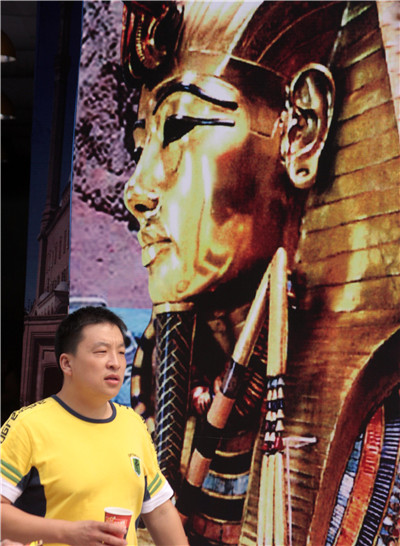 |
|
A man goes by a billboard advertising Egypt's tourism in Wangfujing Street, downtown Beijing.CHINA DAILY |
The bazaar before the ancient Karnak Temple in Upper Egypt's Luxor tourist city bustled with a substantial number of Chinese tourists visiting the city, following months of acute recession.
"Business died as most foreign tourists stopped visiting the city lately," Wael Ahmed, an owner of a bazaar in Luxor said. "However, business improved after Chinese tourists started visiting Luxor."
An increasing number of Chinese tourists are visiting Egypt following President Xi Jinping's recent visit, reviving Egypt's tourism industry.
Tourism in Egypt was dealt a heavy blow following the Russian airplane crash in North Sinai last October, after which several countries, including Britain and Russia, suspended their flights to Egypt.
This further augmented the recession in the country's already ailing tourism sector which is a major source of its national income and foreign currency reserves.
However, even before the plane crash, Egypt suffered a sharp decline in tourism due to three years of political turmoil, including two mass uprisings which toppled two presidents, forcing several countries to ban their citizens from visiting Egypt for safety reasons.
Luxor, once an Ancient Egyptian capital, suffered similarly as with Egyptian tourist cities.
However, the industry has recently improved as hundreds of Chinese tourists visit the city daily.
"As you can see, Chinese tourists are everywhere in Luxor," Ahmed said. "I was going to close my shop a month ago but I changed my mind after Chinese tourists started coming."
He added that Chinese tourists also frequent restaurants, coffee shops, bazaars and malls nearly as much as American and European tourists did, though they've recently stopped visiting Luxor.
Egypt, the most populous Arab country, with its rich culture, now pins immense hope on China and is eager to tap into the China's tourism market.
During a recent interview with Xinhua, former Egyptian Tourism Minister, Hisham Zaazou, said that Egypt received 35 percent additional tourists from China immediately following president Xi's visit to Egypt.
"The number of Chinese tourists increased from 65,000 to 135,000 in 2015," Zaazou said, adding that he believes the number could rise to between half a million and a million shortly, once flights from China to Egypt increase.
To encourage more tourists to visit the country, Egypt exempted Chinese tourists from visa requirements, allowing for visa-upon-arrival if they are sponsored by a tourist agency and are financially comfortable.
Apparently, these measures as well as Luxor's charm attract Chinese tourists looking for tranquility surrounded by breathtaking ancient ruins scattered throughout the city.
Luxor is home to Tutankhamen's tomb in the Valley of the Kings and its magnificent sunset at the majestic Karnak and Luxor temples are a perfect choice for culture-based tourism.
"It is very pleasant here amongst the city's old temples, with lovely weather, and it is quite safe," said a 17-year-old Chinese girl called Helen, as she toured the Temple of Karnak.
Helen is visiting Egypt with her family for the first time, but she said it will not be her last.
"We prefer Luxor as it is a historical city and we learn so much about Egypt's history since it is one of the most ancient civilizations in the world, comparable to China," Helen's mother said.
Helen's mother also said visiting Egypt is much cheaper than neighboring countries such as the United Arab Emirates, Lebanon or Jordan, therefore it is more attractive to Chinese tourists.
Chinese and Egyptian tourist agencies promote Luxor to Chinese tourists as a great city to visit in Egypt.
"Egypt in general and Luxor in particular are rather special. Luxor's 7,000 year-old history attracts Chinese tourists who single out Egypt for its rich history, and they also want to learn more about its local culture," said Yang Lili, a Chinese leader of a tourist group during a tour of Karnak Temple.
Yang said Chinese tourists were very scared to visit Egypt at first due to the country's political and security situation, but they were encouraged following the Chinese president's visit earlier this year.
"We don't worry too much about security as it is very safe here, and not as dangerous as the news portrays it," she said.
